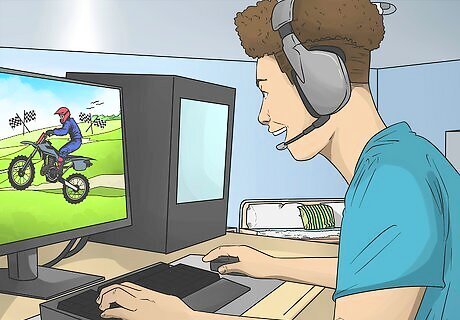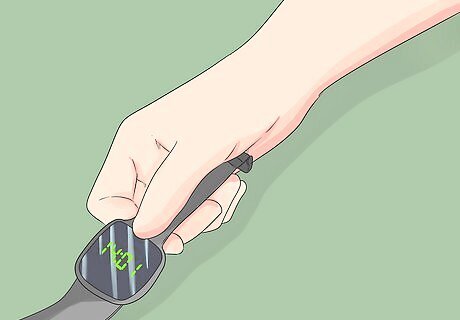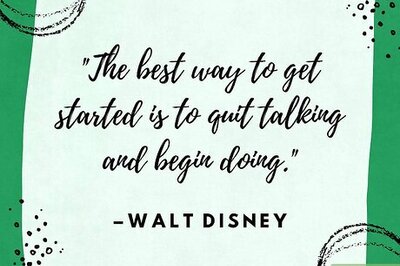
views
Coping with Shorter Wait Times

Lose yourself in a great book. Whether you are waiting in line, waiting for your date to finish getting ready or eagerly awaiting an important day, the time will pass faster if you are able to find a way to distract yourself. When you read, you become engrossed with the story or the topic, and so it will be easier to keep your mind off your wait-time. It's easy enough to keep a slim paperback or an electronic reader in your bag for unexpected waits. Similarly, if you're tossing and turning in anticipation of your upcoming vacation or big date, turning to a book is a great way to feed your mind and distract it at the same time!

Have other methods of distraction readily available. If time seems to be dragging on, and if you don't have a book or magazine ready (or if you're just not in a reading mood today), look for other engaging activities. Other great ways to distract yourself include watching movies, getting caught up on the latest hit television shows, playing video games, or knitting.

Move your body, preferably outside. If you're able to get away, consider going for a walk or a run to distract yourself. The fresh air and change of scenery can help you deal with your frustration and impatience. If you're waiting for a flight or an appointment, for example, you may not be able to leave the premises, but you still may be able to fit in a short walk. There's no need to stay parked in the waiting area outside your gate at the airport, given that there are signs with flight info at regular intervals . Moving your body and stretching your limbs can help you deal with the wait.

Listen to music. Music can have profound effects on our moods, and so if you are looking for ways to distract yourself of keep your anxiety down as you have to wait, be prepared with a good set-list. This is a great step to combine with the one above (move your body): if you're concerned that you'll still be focused on what you're waiting for (for example, maybe you have an important job interview in the morning), pop in your ear-buds as you get moving. It's hard to worry about waiting while trying to sing along with your favorite tune.

People watch. There's nothing wrong with burying your nose in a good book or using your phone as a way to distract yourself when faced with a long or unexpected wait. Keep in mind, though, that you may have a readily available source of entertainment right in front of you: look up at observe all of the interesting characters around you. Without being obnoxious or intrusive, engage in a little bit of eavesdropping. But don't get into their personal lives. That could lead to a lot of trouble and drama if you do. Invent back-stories for the people you see: write them down for your own amusement or text your observations to a friend.

Make the most of your time. Think of the time you have to spend waiting as an unexpected gift of time that can be put to good use instead of something to be endured. Easier said than done, we know! Of course it's annoying to have to wait at the doctor's office 45 minutes past your appointment time. Instead of fuming and checking your watch every few seconds, though, do what you can to cross other tasks off your to-do list. Use the time you have to spend waiting cleaning up your email inbox, writing thank-you notes (keep a few blank note-cards in your bag), filing your nails, journaling, etc.

Divide up the time into shorter increments. Maybe you're overwhelmed at the prospect of completing a long, grueling work-out or a similarly long and tough exam. If time drags on and the end of your suffering seems far beyond the horizon, try the mental trick of dividing your task or waiting period into shorter more manageable chunks. This may help the time pass more quickly. For example, maybe you have to run twelve hard 400s (for non-track folks, this is a tough running workout: a 400 is once around the quarter-mile track; if you're running it hard, you are almost sprinting). Instead of counting down from twelve, think of the workout as being divided into four sets of three. Your immediate focus will be on the first set, and you only have to get through three laps. By the time you've finished that, you'll only have three sets left. Perhaps you are dreading getting through a difficult standardized exam that will take up all day. Instead of thinking that you have six hours of testing to endure, though, focus on just getting through the individual sections: the quantitative reasoning section, the language section, the writing section, etc.

Put away your watch or clock. We've all played this game before while trying to cope with painfully long waiting times: “I won't look at the clock until half-an-hour has passed,” only to finally look at the clock and see with dismay that only five minutes have passed. If you're trying to make time pass faster (enduring a travel delay or getting through a rough day at work, for example) obsessing over the clock will only reinforce your frustration and boredom. If at all possible, put your watch or clock out of sight. If you absolutely need to be ready at certain time, set an alarm and then resolve not to peek before it goes off.

Stay cool, literally! Studies have shown that body temperature seems to have an effect upon our perception of time: the hotter we are, the more our perception of time slows down. Conversely, time seems to speed up (a bit) when we're cooler. Though there's no guarantee that time will suddenly zip by if you remove your sweater, it certainly won't hurt.

Catch some zzz's. Remember how awful and tedious long car trips were when you were a kid? But remember how awesome it was to doze off and wake up right as your parents pulled in at your destination? Sleeping of course makes time pass faster, so if you're able to take a short nap or get to bed earlier, you'll be able to shorten your conscious waiting time. If you're having trouble falling asleep because you're so eager for tomorrow's plans (or anxious at what awaits you), try meditation or relaxation techniques to help you fall asleep more quickly.
Coping with Longer Waits

Keep your eye on the prize. Waiting is rarely easy, but it can be especially difficult to handle when we're forced to be patient for days, weeks, or even longer. Time can seem to come to an absolute standstill when we're forced to wait much longer than we want, but it will actually help to remind yourself about what exactly it is you're waiting for or working towards. Perhaps you are struggling to get through the day-to-day grind of a terrible summer job that you need to pay for college tuition. Summer can seem like an eternity when you're stuck in a job you hate, but reminding yourself daily about why you've committed to this will help you get through it. As motivation, consider keeping a copy of your fall course schedule in your pocket at work, or wear a pin with your school's insignia.

Know that good things really do come to those who wait. Of course we want what we want when we want it, but working hard and waiting for something adds value to it. You'd get good use out of a new computer if it was suddenly given to you, but you'll appreciate it more if your gratification is delayed. You may have hated having to deal with your old model, but waiting (and being stuck with your old clunker for so long) will make your new computer seem so much more awesome by comparison once you finally manage to get it.

Take up a hobby. Whenever time seems to crawl to a stop, we're better able to cope by finding ways to distract ourselves. If you are faced with a longer wait time, it's even more important to try to find ways to fill your time. Taking up a hobby that allow you to develop your talents and explore your interests is one of the best ways to get through a long wait. For example, you may be separated from a loved-one and are facing many more lonely weeks before you can be reunited. It's great to spend some of your time planning for their return, but if all you do is focus on far-away day, you're current loneliness and impatience will likely increase and perhaps become unbearable. Now is the perfect time for you to work on training for a marathon, take up gardening or woodworking, make the perfect loaf of bread, etc.

Do your best to think positively. If you're waiting for something which has an uncertain outcome—exam scores or the result of a medical test, for example—there are good reasons in support of having an optimistic outlook and looking to the future with a measure of hope. For example, you may be able to reduce your risk of hypertension and the healing process may be improved if you are able to maintain a positive outlook about your situation. There is evidence that negative emotions can slow down our perception of time. Our time is more focused on what we're going through when we're depressed, anxious, or bored, and so it will feel as though time is moving more slowly.

Allow yourself to have moments of doubt or negativity. While you'll be better able to deal with long waits and periods of uncertainty if you are able to maintain a positive attitude, it's only natural to sometimes feel down and pessimistic about your situation. If you place too much pressure on yourself to be optimistic all the time, you'll only be more frustrated with yourself when you're not able to preserve a constant sunny outlook. There are actually some benefits to having a (slightly) pessimistic outlook. If you end up getting a poor score on your exam, for example, you won't have been blind-sided. Spending some time imagining the worst-case scenario can better prepare you for what is hopefully just an unlikely outcome. If the worst does come to pass, you may be better prepared to move forward.

Go with the flow. This waiting game is about achieving balance: Do your best to be positive, but be willing to give yourself a break and not fight too hard against your negative thoughts. Some research has suggested that when we try too hard to self-regulate our emotions, our perception of time is negatively effected. For example, in a recent study, participants who were asked to remain emotionally neutral when watching clips from a tear-jerker judged that the clip was significantly longer than did those who hadn't been asked to control their emotions.

Focus on others. Turning your attention outwards and finding ways to help others is an excellent way for you to get through a long waiting period. Not only are you helping yourself by finding an activity to make the time pass a bit more quickly, but you're actually making a positive impact on the lives of others. Volunteer at your local soup kitchen, tutor area children, help your elderly neighbor with her yard-work—there are innumerable ways to use your talents and skills to help those in your community. One of the most effective ways to find happiness and fulfillment in your own life is to not make your own happiness your explicit goal, but to instead aim to make others happy. Being happy and enjoying what you are doing will in turn help you with your own quest to be patient. You may have heard that time flies when you're having fun, and there's some research to indicate that our perceptions of time really do quicken when we're enjoying ourselves.

Be present in the present. While it's important to have goals that we must work for (and wait on), and while we are sometimes forced to get through difficult times, it's important not to let your life slip by while you are planning for the future. Write down what is going well in your life and what your sources of happiness are. This will help you maintain a positive outlook and keep things in perspective. Be sure to grab opportunities to have fun when they present themselves!



















Comments
0 comment